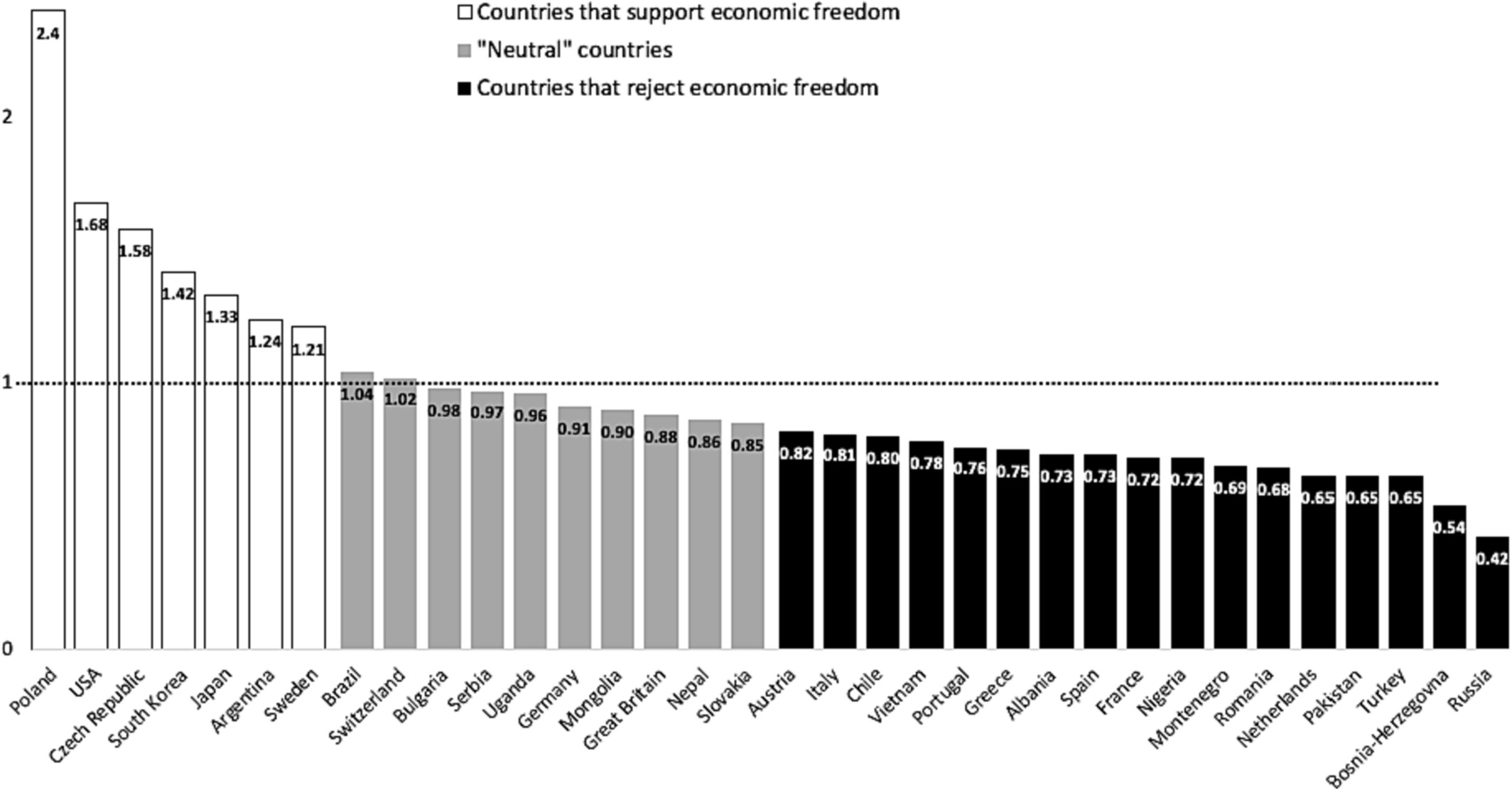I endlessly grouse and complain about how politicians undermine economic liberty.
Part of the problem, however, is that in many cases voters are misguided.
Back in 2014, I shared polling data from Pew about attitudes toward free markets. Surprisingly, the people of Vietnam had the most favorable views of capitalism.
And Argentinians were the most negative (which doesn’t bode well for next month’s contest between a statist Peronist and a hard-core libertarian).
We now have some newer polling data to review. This time, the people of Poland are the runaway winners, while Russians get the booby prize for being the most statist.

As a patriot (in the proper sense), I’m happy to see the United States in second place.
By contrast, I am surprised that Switzerland is a “neutral” country. Though maybe that’s more evidence for my hypothesis that the Swiss are practical libertarians rather than ideological libertarians.
Meanwhile, I am disappointed to see anti-capitalist views dominating in Romania and the Netherlands since both countries get decent scores in terms of economic policy.
This data comes from an article in Economic Affairs, authored by Rainer Zitelmann. Here is some of his analysis.
In this article, I analyse the findings of a survey in 34 countries. …The individual surveys took place between June 2021 and December 2022… Respondents were presented with a total of six statements, three of which favoured economic freedom and market economics. The other three statements advocated restricting economic freedom and according a far greater role for the state. …A coefficient of exactly 1.0 would mean that there is no clear tendency in the surveyed country and that respondents are balanced between the free-market-minded and those more in favour of a strong role for the state in the economy.
For wonkier readers, here are some additional details about how support for economic liberty varies based on ideology, age, income, gender, and education.
In most of the surveyed countries, unsurprisingly, the respondents who describe themselves as being on left of the political spectrum are most opposed to capitalism or least pro-capitalist. One exception was Poland, where people who classify themselves as moderate leftists are even more positive about capitalism than those on the right of the political spectrum. Respondents on the right of the political spectrum tend to have a positive perception of capitalism in most of the surveyed countries. However, there are also major differences: In ten countries, …the further to the right, the more pro-capitalist… In more countries (16), however, a different correlation holds: …moderate right-wingers (respondents who rank themselves a 6 or 7 on the left–right scale) have the most positive attitude towards capitalism or the least negative attitude, while respondents who are even further to the right are less approving of capitalism.
There are countries where age has hardly any bearing on attitudes towards capitalism, for example France and Switzerland. In other countries, however, there is a clear link between age and attitudes towards capitalism. This is clearest in the United States, where respondents over the age of 60 have a very positive attitude towards capitalism (2.27), while younger people are neutral to slightly negative (under the age of 30: 0.90).
Not surprisingly, in almost all countries low-income earners tend to be anti-capitalist or at best neutral, and high-income earners are comparatively more positive (or less negative) about capitalism. The only three exceptions are Vietnam, Nigeria, and Pakistan. …differences are particularly pronounced in Spain and Switzerland, where low earners are vehemently anti-capitalist and high earners are overwhelmingly pro-capitalist.
In most of the countries surveyed, male respondents are more positive towards capitalism (or less critical of it) than women. There are very few exceptions, such as Vietnam, where women are more pro-capitalist than men.
In 26 of 34 countries, the…better-educated have a (slightly) more positive or less negative attitude towards capitalism than people with a basic level of education.
Lots of fascinating data. From my American perspective, the big gap between young people and old people is not a surprise (see here, here, and here). Maybe it’s time to raise the voting age to 30?


